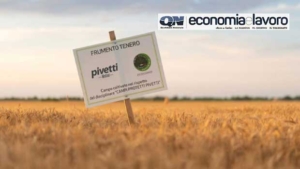
THERE ARE 150 CANDLES to blow out for Molini Pivetti. The history of the mill spans and encompasses, in fact, that of a century and a half. Founded in 1875 by Valente Pivetti, the mill, which is located in Renazzo, in the municipality of Cento (Ferrara), has grown. From a small steam mill, for grinding soft wheat, in fact, over the decades, this company has become a large industry, with three production plants, six storage centers, three advanced research laboratories and an annual production capacity of 245 thousand tons of flour.
Molini Pivetti represents a long Italian entrepreneurial history, made of family, commitment and passion. Five generations have passed since the founder, Valente Pivetti, in 1875 decided to build a steam mill for grinding wheat between Bologna and Ferrara, a few kilometers from Cento: today as then, the mill is the soul of the Group, a symbol of the solidity of Molini Pivetti in preserving and reinterpreting a tradition that changes and renews itself continuously, capable of adapting to the reality that is evolving but also of adopting innovative technologies to position itself on the market as a protagonist.
[…]
In 2016, with Campi Protetti Pivetti , the company launched a truly ambitious project: certifying and controlling the origin of wheat. The brand is guaranteed by the international body CSQA , which certifies a transparent, rigorous supply chain, rooted in the provinces of Bologna, Modena and Ferrara. Here, 100% Emilian flours are born (Gran Riserva Line), authentic, genuine, the fruit of our land and of “team” work, thanks to the constant commitment of farmers, agronomists and collaborators. But quality is not enough: Molini Pivetti is committed to preserving the environment, from the beginning to the end of the production process.
Since 2018, with the " Campi Protetti Pivetti Sostenibile " project, the company has ensured that part of the Campi Protetti Pivetti supply chain produces wheat intended for a line of sustainable agriculture flour. This brand, certified by the international body CSQA , not only guarantees the origin of the wheat, but is good for the environment: it is synonymous with a controlled and sustainable supply chain from sowing to disposal of the paper bag. Since 2018, Molini Pivetti has started to measure the environmental impact of the supply chain, through the Lca (Life Cycle Assessment) analysis , to identify the consumption of carbon dioxide for a kilo of flour, reducing carbon dioxide emissions in just a few years, from 0.546 for each kilo of flour in 2019, to 0.490 kilos in 2022.
[…]
Source: QN Economy and Work